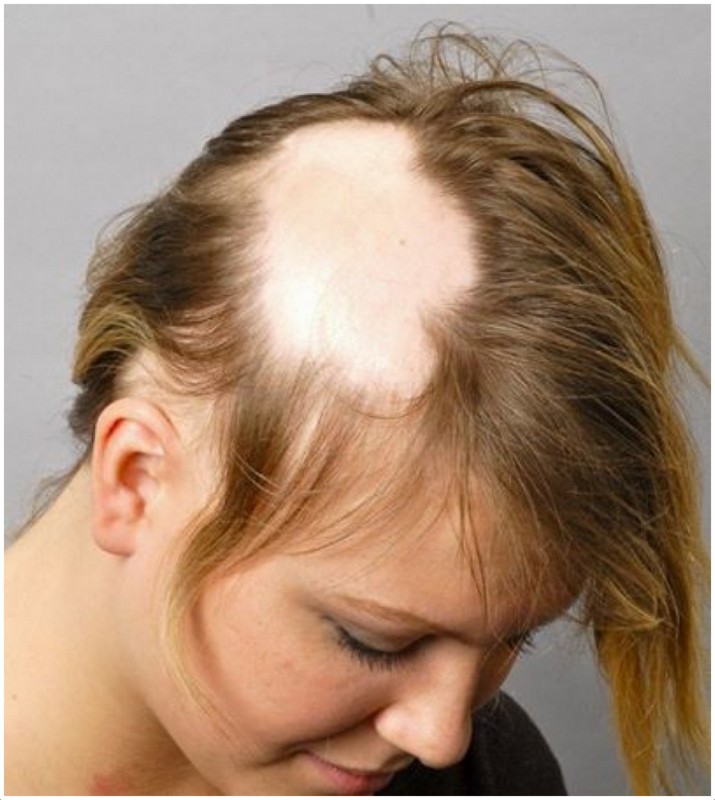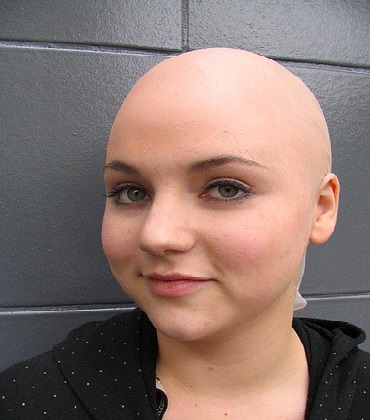https://philaholisticclinic.com/treatment-for-alopecia-areata/
Treatment for alopecia areata is always challenging. Unfortunately, the efficiency of the traditional treatment for alopecia areata is not as high as our patients expect. However, natural treatment for alopecia areata is often appeared much more effective and, at the same time, safe and affordable.
Men, women, and children suffer alarmingly from hair loss. Alopecia is defined as hair loss or baldness. This type of hair loss has a terrible impact on the emotional wellbeing of many sufferers.
Treatment for alopecia areata depends on the type of disease and how the disease is progressing. Alopecia areata is an autoimmune disease that causes hair loss, especially on the scalp. It progresses very quickly and can occur in childhood as well as in adult men and women. It’s an autoimmune disease, which means that the immune system attacks healthy hair follicles, causing hair to fall out and stop growing.

Alopecia areata is not just hair loss on the scalp; it can occur on any part of the body. People sometimes suffer from alopecia of the eyebrows, genital area, and beard. Alopecia can affect people so severely that they often develop depression or severe anxiety.
Alopecia areata affects young men from puberty to young adulthood. This type of baldness differs in that the hair around the temples and sides of the head becomes thinner. Alopecia areata can also affect women. Your hair loss is more likely to occur on the crown of your head, on the front, or on the sides.
Alopecia areata symptoms
Alopecia areata symptoms can affect a small area where the hair is falling out, resulting in smooth, rounded bald patches on the scalp or body. In rare cases, this can lead to complete hair loss on the scalp and body.
The baldness patterns associated with this disorder are usually small, round, hairless patches on the scalp. Hair loss can also take the form of general thinning rather than visible bald spots. In severe cases, a person can lose all of the hair on their scalp and their body.
Baldness can come and go; you may experience hair loss in one area and regrow hair to lose hair in another area.

Your doctor can diagnose alopecia areata based on a description of your symptoms, a physical exam of your pattern of baldness, and laboratory tests on a sample of hair.
Causes of alopecia areata
Alopecia areata is an autoimmune disease in which the body’s natural defense system attacks the follicles, damaging them and affecting their ability to produce hair. Although the damage is not always permanent, alopecia areata is a chronic disease with no known treatment. Hair loss usually occurs regularly, with periods of hair loss and regrowth. In some cases, especially if the disease begins in early childhood, the hair loss can become permanent.
Although doctors don’t fully understand why the disease occurs, some risk factors are known. You are more likely to develop this condition if you:
- Have a family history of the disease
- Have another autoimmune disease such as rheumatoid arthritis or diabetes;
- Have unusually textured, colored, or shaped fingernails and fingernails.
Traditional allopathic treatment for hair loss
There are several traditional treatments for alopecia areata, which are listed below:
- Observation – If the hair loss is not generalized and the disease has not progressed, the hair can grow back. This is the most likely outcome and occurs 50% of the time.
- Oral Corticosteroids: It is an ideal anti-inflammatory drug to treat alopecia areata
- Diphenylcyclopropenone: This treatment for alopecia areata has been shown to increase hair growth over time in approximately 40% of patients.
Treatment for alopecia areata may not always work, especially if it occurs at a young age or long-term, and even with complete hair loss (total alopecia – when all the hair is on the scalp, lost or universal alopecia – when all of the hair on the body is lost). However, natural treatments for alopecia areata may be needed to overcome this condition.
Natural treatments for alopecia areata
In general, those with alopecia areata who are looking for a natural treatment for alopecia areata need not worry.

Here is the list of natural treatments for alopecia areata:
Essential oils for alopecia areata – popular home-based natural treatment for hair loss
Essential oils are often viewed as a natural treatment for alopecia areata and are very effective. A double-blind, placebo-controlled study showed that a combination of placebo oil or essential oils could work. The study was carried out with approximately 86 people. The essential oils that are used to naturally treat alopecia areata are:
- Thyme
- Rosemary
- Lavender
- Cedar
- Carrier oil mixture with jojoba and grape seed
The mixture was massaged onto the scalp daily. In fact, as a natural treatment for alopecia areata, the control group only used the carrier oils per day. Over approximately 7 months, 19 out of 43 or 44% of those taking the essential oil blend showed an improvement compared to 6 out of 41 or 15% in the control group. No side effects were noted, although these topical essential oils can cause allergic reactions.
Onion juice – another home-based natural treatment for alopecia areata
This is a potential natural treatment for alopecia areata. A study conducted by the Journal of Dermatology showed that the effectiveness of onion juice or placebo affected the growth of alopecia areata hair 2 weeks after treatment. 17 people showed development after 4 weeks, while the number increased to 20 after 6 weeks. The improvement was more significant in men than in women.
Acupuncture for hair loss – ancient Chinese natural treatment
Acupuncture for alopecia areata is a natural treatment for alopecia areata that has shown some evidence of potential benefits related to hair loss.
The research concludes that acupuncture for alopecia areata is safe and effective in regenerating hair growth for baldness due to alopecia areata. The researchers conclude that acupuncture for alopecia areata is one of the most important TCM methods for treating alopecia areata.
Acupuncture for alopecia areata promotes blood circulation, especially in the skin and scalp. Once blood flow increases, nutrient levels are replenished in various areas of the skin to encourage hair growth. Further research shows that acupuncture in alopecia areata regulates the neuroendocrine system and benefits the immune system. The researchers concluded that acupuncture for alopecia areata is safe and effective for treating alopecia areata to increase blood flow and repair tissues.
Acupuncture for alopecia areata leads to more positive results in patients than drug treatment in patients with alopecia areata.
Homeopathy for alopecia areata – #1 natural treatment for alopecia areata
Homeopathic for Alopecia Areata treatment is one of the natural treatments for alopecia areata is very effective in treating alopecia areata. Homeopathy for alopecia areata affects our body by optimizing our immune system. Thus, homeopathy for alopecia areata can be an effective and permanent solution to this problem.
Also, once the hair loss is treated with homeopathy for alopecia areata, the chance of the problem recurring is greatly reduced. Although some homeopathic medicines, such as fluoric acid and phosphorus are very commonly and effectively used in treating this disorder, it is necessary to conduct a constitutional analysis before each prescription. The constitution analysis is the prescription assessment of your physical and mental characteristics.
- Arsenicum album: This natural remedy for alopecia areata recommended in homeopathy when alopecia appears as circular bald spots with itching and burning on the scalp. These symptoms worsen at night. In some cases, the scalp is also sensitive.
- Vinca Minor: This is another homeopathic remedy for alopecia areata that is helpful in cases where the hair is falling out in places that are then replaced with white hair. There may also be itching and severe scratches on the scalp.
- Fluoric Acid: It is one of the most common natural remedies for alopecia areata. It helps in the regrowth of hair in the bald patches.
Herbs for hair loss another approach to natural treatment for alopecia
Herbs for alopecia areata are one of the proven natural treatments for alopecia areata. The antioxidants found in herbs for alopecia areata first became famous for the discovery of the amazing effects of grape seed extract and its powerful ability to eliminate free radicals.

More recently, Japanese researchers set out to lab test hundreds of compounds found in herbs for alopecia areata to see if they stimulated hair growth, and they found that the seed extract compounds made grape hair grow faster than that pharmaceutical preparation Minoxidil.
Upon further testing using variations of the polyphenols, they found that those found in the apple peel polyphenols were even more potent, almost twice as effective as Rogaine. With the addition of forskolin, another herb for alopecia areata extract, the effects were even greater.
List of herbs for hair loss
- Chinese hibiscus (Hibiscus rosa Sinensis): Chinese hibiscus is an evergreen herb for alopecia areata and one of the natural treatments for alopecia areata. Herbal teas are often made from its edible and vibrant flowers. Hibiscus is believed to stimulate hair follicles, increase follicle size, and increase hair growth.
- Brahmi (Bacopa monnieri): Brahmi, also called Bacopa, is a creeping herb for alopecia areata and natural treatment for alopecia areata that is used in Ayurvedic medicine. It contains alkaloids that are believed to activate proteins that are responsible for hair growth.
- Ginseng (Panax Ginseng): Ginseng is one of the herbs for alopecia areata and an ancient natural treatment for alopecia areata. It contains saponins, which are believed to promote hair growth by inhibiting 5a-reductase. It is an enzyme that has been linked to hair loss in men.
Conclusion
Hair loss can seriously affect your self-esteem. Men and women suffering from hair loss are often very aware of their appearance. The good news is you don’t have to face baldness issues all the time. This article provides an overview of the causes of alopecia areata and the wide range of natural treatments for alopecia areata.
For your holistic evaluation by Dr. Tsan, contact our clinic, or book your appointment online
Comments
Post a Comment